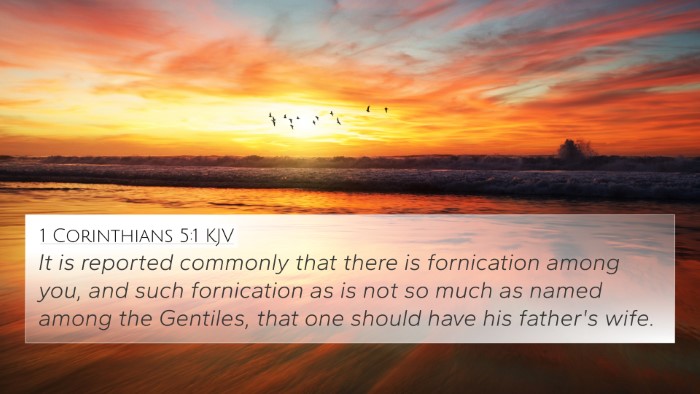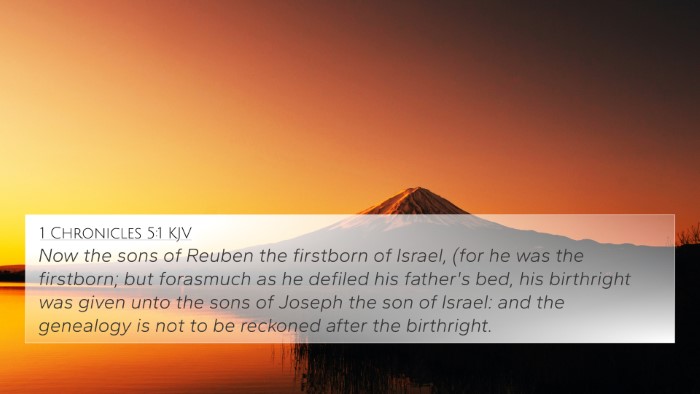Understanding Deuteronomy 27:20
Bible Verse: Deuteronomy 27:20 - "Cursed be he that lieth with his father's wife; because he uncovereth his father's nakedness. And all the people shall say, Amen."
Verse Summary and Interpretation
The verse from Deuteronomy 27:20 serves as part of a larger collection of laws given to the Israelites, related to familial conduct, purity, and holiness. The implications of this commandment are significant as they signify both a societal and divine order. The curse pronounced here is not just a punishment; it is a violation of sacred familial bonds, emphasizing the seriousness with which such actions are viewed within the biblical community.
Historical Context
In the context of ancient Israel, the family was the central unit of society. The laws provided rules to uphold moral and ethical conduct, fostering a sense of community and identity among the people. This verse serves as a caution against sexual immorality, which could lead to family discord and societal breakdown.
Theological Insights
The apostle Paul reinforces this concept in the New Testament (see 1 Corinthians 5:1-5), where he addresses similar moral issues within the early church. The scripture indicates that illicit behavior not only disrespects family dynamics but also brings about divine consequences.
Key Themes and Their Connections
- Familial Integrity: The emphasis on male-female relationships within the family unit.
- Moral Purity: The call to a standard of morality that reflects God’s holiness.
- Divine Judgment: The concept of curses as judgments from God for disobedience.
Cross-References
- Leviticus 18:8 - Prohibitions against uncovering the nakedness of relatives.
- 1 Corinthians 5:1 - Paul addresses immorality within the church.
- Genesis 9:22 - The story of Ham and Noah as a warning against dishonor in familial relationships.
- Exodus 20:12 - The fifth commandment emphasizes the importance of honoring one's parents.
- Deuteronomy 22:30 - Further prohibitions related to sexual conduct.
- Colossians 3:5 - Instructions against sexual immorality in the New Testament.
- Hebrews 13:4 - The sanctity of marriage and the condemnation of adultery.
Using Bible Cross-References for Deeper Understanding
By examining Deuteronomy 27:20 alongside the given cross-references, readers can find thematic and moral connections between various scriptures. This method, known as cross-referencing Biblical texts, serves as a valuable tool for studying the Bible, providing insights into the overarching narrative of God's relationship with humanity.
Conclusion
Deuteronomy 27:20 serves as a stark reminder of the importance of maintaining family integrity and moral purity. Understanding this verse not only through its immediate context but also via its connections to other scriptures deepens one’s grasp of Biblical teachings on ethics and divine law.
Keywords for Further Study
For those studying the connections within the Bible, consider exploring these useful tools for Bible cross-referencing:
- Bible concordance
- Bible cross-reference guide
- Cross-reference Bible study
- How to use Bible cross-references
- Bible cross-reference system
- Cross-referencing Bible study methods
- Bible reference resources
- Bible chain references
- Comprehensive Bible cross-reference materials
Essential User Intent
For those looking to understand how Deuteronomy 27:20 connects to other verses, here are ideas to consider:
- What verses are related to Deuteronomy 27:20?
- Find cross-references for Deuteronomy 27:20.
- How do Leviticus 18:8 and Deuteronomy 27:20 connect?
- Similarities between Deuteronomy 27:20 and 1 Corinthians 5:1.
- Bible verses that support the moral implications of Deuteronomy 27:20.












